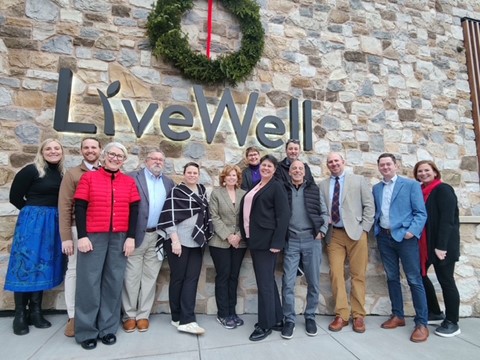
Author:
Kim Warchol, President and Founder of DCS at CPI
Common Misconceptions
Even though most people have a general awareness and understanding of Alzheimer’s disease, there are a plethora of misconceptions- especially around understanding a person’s potential to live well with dementia and what constitutes quality dementia care. Let’s examine this further.
Misconception #1
"In the early stages of dementia, a person who repeats their questions or appears stubborn or resistive is doing this just to be an annoyance".
The truth is…. A person in the early stage who repeats themselves or is stubborn and resistive is just doing the best they can with what they have. The decline in their memory and other cognitive abilities is frightening. They ask again because they don’t remember. They cling to the familiar, stubbornly resisting change because it helps them to feel safer and function more capably. Repeating and resisting may be their way of coping with what feels like a scary loss of capability and control, created by memory gaps, and not an intentional act to aggravate and annoy.
Misconception #2
"In the early stages, someone with dementia is often thought to have more capabilities than they actually have, especially regarding doing their Instrumental Activities of Daily Living (IADLs)."
The truth is…. In the early stages, language skills may be preserved, making it difficult to detect their dementia. Yes, they may be able to “talk the talk,” but they are likely struggling mightily to “walk the walk.”
You may notice changes in the ability to drive safely or do other IADLs like cooking, managing finances and taking medications, independently. When we observe challenges or breakdown in ability to safely engage in one IADL area, there is likely deterioration of ability in all IADLs because these high-level activities require the same set of cognitive abilities (Executive Functions). It is imperative to go beyond what someone says and take your observations seriously. And remember that if we see decline in one IADL, we can anticipate they are also experiencing decline in function and safety in the other IADL areas.
Misconception #3
"Once the disease advances, it is believed there is nothing someone with dementia can do anymore – they are helpless."
The truth is…. When a person moves through the stages of dementia, they do lose functional cognitive abilities at each stage. However, abilities remain at every stage of dementia. We must see the glass as half full or we create “excess disability,” which is disproportionate dependence, and harmful on many levels.
We must reframe what we observe into positives. For example, someone who we label as a wanderer is often limited by carers because this is looked upon as a problem. However, if we reframe what we see to a positive perspective we notice the “wanderer” is showing us their ability to walk, and their desire to get up and engage in life. These are capabilities that must not be squelched with negativity but lifted with glass half full perspective. This helps the person to do as much for themselves as possible at each stage, which alleviates the care burden and has many additional positive emotional and health benefits.
Misconception #4
"Behaviors such as agitation, hitting, and cursing are considered an inevitable symptom of dementia, that we can do nothing about, other than to medicate. I often hear, “It’s normal for people with dementia to become mean and belligerent".
The truth is… Yes, some personality changes can occur. As inhibition of thoughts and actions becomes impaired due to changes in the brain from dementia, a person may become more impulsive, salty, or even rude as their filter breaks. And they will experience a lower stress threshold because of dementia.
Behaviors such as resisting, refusing, being anxious, cursing, hitting, pushing away, and pacing are communications that “something is wrong.” You would likely “behave” the same way if you felt as they did (e.g., scared, in pain, or uncomfortable) or if you found yourself in a similar stressful situation. If we address the root cause of their feelings and successfully mitigate “what is wrong,” the “behavior” can go away without needing to resort to medications as a first-choice solution.
Misconception #5:
“When at the last stages of dementia, it is no longer possible to have a relationship or interact because “they are gone".
The truth is advanced dementia will severely limit a person’s ability to communicate through words and to understand what others say. And there will be significant erosion of memory, speed of processing, and other cognitive abilities.
However, it should NEVER be assumed that this person is no longer there or incapable of communicating or interacting. The soul continues to burn brightly- do we see it? The ability to hear and see are still present-do we interact with them as if this is true? The ability to respond and communicate through facial expressions, body language or sounds is still there- do we wait long enough, observe, and listen? The ability to feel is still present-do we realize the impact we have on how they feel?
Just as an infant has so many significant limitations in communication and cognition, but is still capable of relating, the soul of the person living with dementia is still very much there. As is their ability to either feel comforted, loved, and connected, or scared, lonely, dehumanized and abandoned. With tender and patient communication and interaction we preserve their worth and dignity and we connect at the most basic and important level- heart to heart.
Misconception #6
"When diagnosed with Alzheimer’s disease or another form of dementia, they are going to experience many years of suffering ahead".
The truth is... Dementia is NOT an inevitable sentence to suffer. Someone can live well with dementia, feeling safe, loved, and purposeful if we help them to engage in meaningful activities at their best ability. And, if we anticipate their wants and needs and minimize causes of suffering such as loneliness, pain, and despair. When cared for by a dementia-capable workforce and enveloped by a dementia-capable society, the potential to thrive goes up exponentially.
How does training help?
Training opens our hearts and minds. When we know better, we do better.
-
Dementia training teaches us to see a person first-not a disease.
-
Dementia training inspires empathy, helping us to become a compassionate carer.
-
Dementia training helps shift our focus, so we encourage what a person CAN do, instead of focusing on the negatives and what they can’t do.
-
Training builds deeper knowledge, understanding, and expertise so we can:
-
Detect dementia early, anticipating and supporting their needs.
-
Become proficient at supporting a person and their loved ones through each stage of the disease.
-
Prevent and deescalate distress behavior, without harmful drugs, while keeping all safe.
-
-
Training builds dementia care confidence and competence. It is a road map for how to adapt our communication/approach, the activity, and the environment to help someone with dementia to be as independent and safe as possible, at every dementia stage. This enables someone to live well with their dementia.
In summary, it is imperative to check and challenge the beliefs we hold about Alzheimer’s disease and dementia because too often they are not only inaccurate, but they are a weight that burdens both the person with dementia and their carers.
Take a moment to think about the misconceptions called out above and any others that may come to your mind. Release them. Challenge them. Be a champion and advocate for living well with dementia by stopping any misconceptions in their tracks and inspiring and empowering with your heart and with quality dementia training.
Gain the knowledge and skills to optimize function, safety, and quality of life for those you serve and dementia care certifications to distinguish yourself or your organization as a leader.
February 2025
Share This Post:
Tell Me More!
Learn how our solutions can benefit you or
your organization.
Continue Learning:



